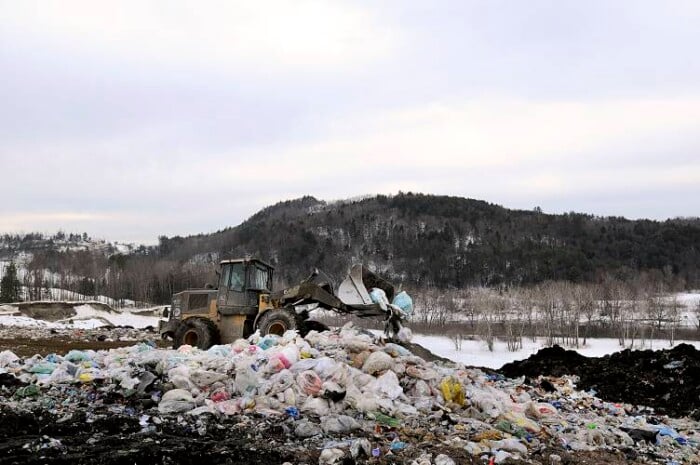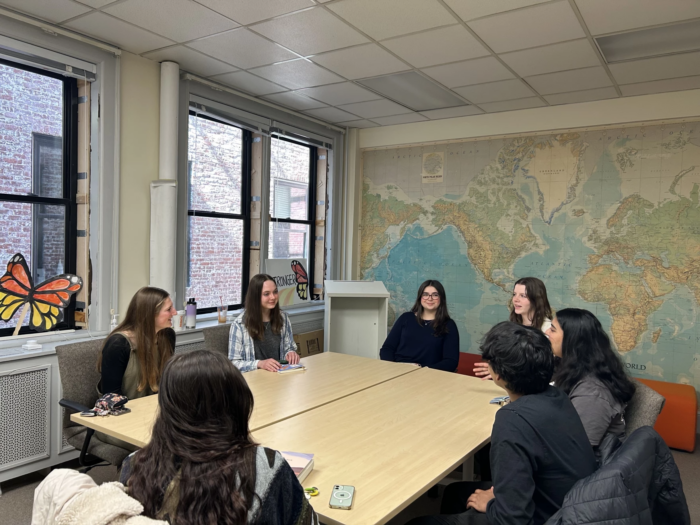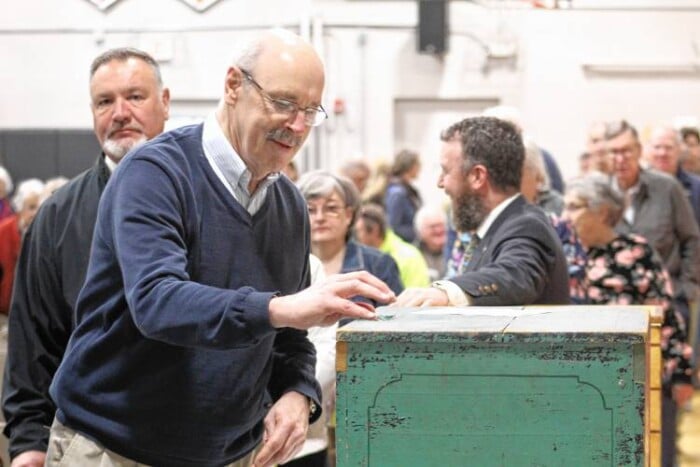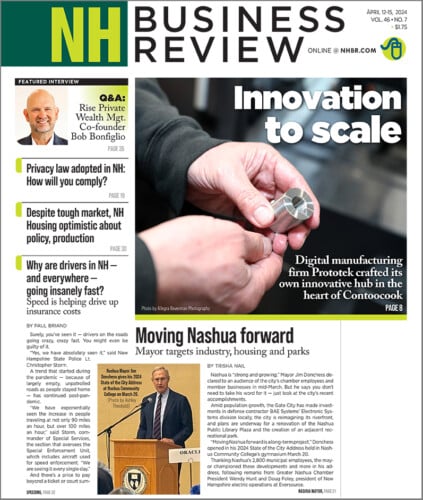NH businesses struggle to balance sustainability, safety in pandemic
Hygiene concerns have led to more use of single-use plastic at restaurants, supermarkets
Rows of tables line the side of The Big Bean Cafe in Durham, as customers sit outside to comply with regulations that New Hampshire has set forward for restaurants reopening amid the coronavirus.
The cafe’s signature item, “The 420,” still tops the menu, but as customers receive their meals, they may be surprised by the use of plastic plates and cups – something that The Big Bean restaurant usually strives not to use in line with the owners’ sustainability goals.
Jon Wells, who has owned The Big Bean in Newmarket with his wife Arley since 2018 and the Durham location since fall 2019, said it was a necessary switch to plastic in order to ensure the well-being of staff. It is mainly to minimize the risk of person-to-person contamination coming back into the restaurant or targeting the staff, Wells said. He said he’s concerned that staff could be exposed to the virus when they clear and clean plates and utensils that members of the public have just used.
“As far as earth-friendly, it’s highly important to us, it still is,” Wells said. The Wellses have ensured that even though the products they are using for outside seating and takeout are single-use, the plates and cups are compostable and the utensils are recyclable.
For a while, the restaurant had to switch to plastic takeout bags, which they wouldn’t normally do, according to Wells, but The Big Bean’s supply company was unable to obtain paper bags because of the pandemic. Despite the changes, the Wellses are still trying to stay true to their values.
“A lot of places have changed to paper or Styrofoam because the cost of doing takeout adds up,” Wells said. “It takes away from profit, and people are doing whatever they can to reduce costs. We haven’t done that; we haven’t changed containers … The money we would have saved for Styrofoam wasn’t enough to justify [the environmental impact] for us.”
Businesses in New Hampshire can make their own decisions about whether to limit use of reusable items – like plates, silverware and shopping bags – that are exposed to the public. Many businesses are erring on the side of caution and opting to use more disposable goods to minimize health risk, but environmental proponents worry this will impact another health crisis: climate change.
Hygienic safety

Alex Freid, founder of the Post-Action Landfill Action Network, says that reusable products are still as safe to use as they have ever been. (Photo by Jodie Andruskevich)
Alex Freid is a 2013 graduate of The University of New Hampshire and founder of Post-Action Landfill Action Network, or PLAN. The nonprofit works with over 400 colleges and universities across the country to aid them in becoming more sustainable in their practices. PLAN’s focus right now is making sure dining halls across the country remain sustainable during the coronavirus pandemic and don’t make the switch to single use materials if it’s not needed.
Freid argued that, even during the pandemic, when people are experiencing a heightened sense of hygienic safety, reusable products are still as safe to use as they have ever been.
“One of the key components of the virus itself is that the coronavirus is primarily spread through breathing it in,” he said. “The CDC [Center for Disease Control] and the FDA [Food and Drug Administration] make that clear. The risk of transmission through hard surfaces, touching the hard surface, that risk is very low. The primary way of spreading is through inhalation of the virus.”
According to the CDC, person-to-person contact is the main way to spread the coronavirus, the disease that leads to Covid-19. The odds of contracting the virus from a surface area are very low too, as it lasts “24 hours on paper and cardboard, and between two to three days on plastic and stainless steel.” But some restaurants still may not feel comfortable with the virus being on a reusable surface at all.
The FDA has standards to prevent disease spread at restaurants, Freid said. He believes the risks to patrons from eating off reusable items is minimal.
“When you go into a restaurant [you] eat off plenty of items that many of people have eaten off before you, and they are safe,” he said.
Reusable bags
Restaurants aren’t the only establishments seeing an uptick in waste. Many grocery chains, including Hannaford, stopped allowing customers to bring their own reusable bags into the store, so more people have returned to single-use plastic bags.
George Parmenter, health and sustainability lead for Hannaford Supermarkets, said that, although the chain had been pushing for reusable bags, they switched to single-use plastic out of caution once the pandemic broke out.
“Most people understood the reason behind it [the switch], which was really to take the possible contamination source out of the equation. The thought process we have is that with the bags in folks’ home, we don’t really know what they are exposed to, they come back to the store and we have to trust that people disinfected and cleaned them [the bags],” he said.
Before the pandemic, Parmenter said, customers were using reusable bags in the largest numbers that the stores have seen due to the plastic bag ban in Maine, New York, and soon to be in Vermont. People had made a habit out of bringing their bags to the store, Parmenter said, and after the pandemic he expects it will be challenging to re-establish that routine.
Fiona Wilson, director of the Sustainability Institute at The University of New Hampshire and the university’s deputy chief sustainability officer, said that it is important for businesses small and large to distinguish short-term and long-term goals about how they want to handle their sustainability efforts during the pandemic.
“We are in an unprecedented global health crisis, so the priority is protecting the health of the population,” Wilson said. “If that means some temporary changes, I think everyone would agree that that’s the right thing to do.”
At the same time, businesses and the public need to consider longer-term goals and sustainability values, she said.
“I don’t think the world is going to go back to normal, but there will be heightened awareness over health and safety for a long time,” she said.
Wilson pointed out that the United Nations’ sustainable development goals include goals around climate change, but also around human health.
“One can’t thrive unless the other thrives,” she said. “We are living through two crises right now – the global health crisis, but we are also in the middle of the climate crisis. Unless we address the climate crisis, the other impacts of the changing climate is going to lead to more public health crises.”
Proper sanitation
Freid and Wilson both agree that the switch back to reusable products for most restaurants will depend on the comfort level of customers. Customers should use this time for sustainable advocacy, they said. In a perfect world, restaurants would already have systems in place where bringing a reusable mug wouldn’t be a sanitary issue, for example, Freid said.
“This pandemic and the shakeup is an opportunity to redesign new systems to ensure proper sanitation methods,” Freid said. “In many ways, the pandemic brought a lack of foresight and lack of planning. We all know that there were many researchers who have said that we are not ready for the next pandemic, and we are not ready for climate change, and we are not prepared for the next crisis. This should be a wakeup call.”
As for The Big Bean, Wells has taken the time before “things go back to normal” to change the menu and start on projects such as having a waitlist app so customers have less contact with other customers in the store. The restaurant is also installing online ordering for the same reason.
“We are staying true to what we are doing and who we are and looking to the future to keep things going,” Wells said.
This article is being shared by partners in The Granite State News Collaborative. For more information visit collaborativenh.org.







